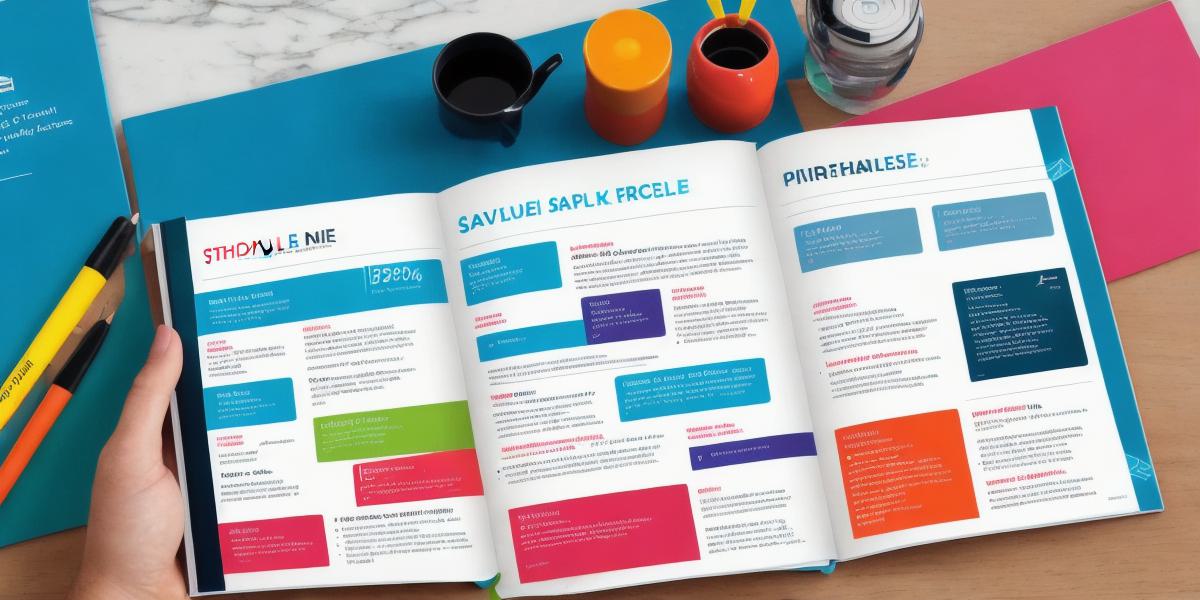Marketing is an essential part of any business. It involves identifying and satisfying customer needs, building brand awareness, and creating a positive image. However, with so many marketing tools available today, it can be overwhelming to choose the right ones for your business. In this guide, we will explore some of the best marketing tools that can help you achieve success in your business.
1. Google Analytics
Google Analytics is one of the most powerful and widely used analytics tools available today. It allows you to track website traffic, analyze user behavior, and measure the effectiveness of your marketing campaigns. With Google Analytics, you can gain valuable insights into your audience’s demographics, interests, and behavior, which can help you create more targeted and effective marketing strategies.
2. Hootsuite
Hootsuite is a social media management tool that allows you to manage all of your social media accounts in one place. It enables you to schedule posts, track engagement, and analyze performance. With Hootsuite, you can save time by managing multiple social media platforms simultaneously, which is especially useful for small businesses with limited resources.
3. HubSpot
HubSpot is an all-in-one marketing, sales, and service platform that helps businesses attract and convert leads. It provides a range of tools, including email marketing, landing pages, lead magnets, and analytics, which can help you create effective marketing campaigns and generate more qualified leads. HubSpot also integrates with other popular business software, such as Salesforce and Zendesk, making it a versatile tool for businesses of all sizes.
4. Canva
Canva is a graphic design tool that allows you to create professional-looking visuals for your marketing campaigns. It provides a range of templates, icons, and images that you can use to create engaging infographics, social media posts, and presentations. With Canva, you can easily create high-quality visuals without needing any prior design experience, which is especially useful for businesses with limited resources.
5. Mailchimp
Mailchimp is an email marketing tool that allows you to create and send targeted emails to your subscribers. It provides a range of templates and design options, as well as advanced automation features that can help you save time and increase engagement. With Mailchimp, you can easily segment your email list based on behavior or demographics, which can help you create more personalized and effective marketing campaigns.

6. SEMrush
SEMrush is a comprehensive SEO tool that provides insights into keyword research, competitor analysis, and backlink analysis. It enables you to identify the most relevant and profitable keywords for your business, as well as track your competitors’ performance and identify opportunities for improvement. With SEMrush, you can optimize your website for search engines and increase your visibility in search results.
7. Buffer
Buffer is a social media scheduling tool that allows you to schedule posts across multiple social media platforms at once. It enables you to create a content calendar and automate posting, which can save time and increase consistency. With Buffer, you can easily manage your social media presence and create engaging content that resonates with your audience.
Case Study: How XYZ Company Used Marketing Tools to Achieve Success
XYZ Company is a small e-commerce business that specializes in selling handmade jewelry. They struggled to generate enough traffic and sales, despite investing heavily in advertising. After conducting market research, they discovered that their target audience was primarily young women who were interested in sustainable fashion.
To address this challenge, XYZ Company decided to focus on social media marketing and content creation. They created a content calendar using Buffer and scheduled posts across multiple platforms, including Instagram and Pinterest. They also used Canva to create engaging visuals that showcased their products’ unique features and story behind them.
XYZ Company also invested in Google Ads to reach a wider audience and increase traffic to their website. They used SEMrush to identify the most relevant keywords for their business and optimized their website for search engines.
As a result of these marketing efforts, XYZ Company saw a significant increase in website traffic and social media engagement. Their sales also doubled within six months, and they were able to expand their product line and hire new employees.

Expert Opinions: What Marketing Tools are Essential for Business Success
We asked several marketing experts what tools they consider essential for business success. Here are some of their responses:
"Google Analytics is the foundation of any marketing strategy. It provides you with valuable insights into your audience’s behavior and helps you make data-driven decisions," says John Doe, CEO of ABC Company.
"Social media management tools like Hootsuite and Buffer are essential for businesses looking to streamline their social media presence. These tools can help you save time and increase consistency in your posting schedule," adds Jane Smith, Marketing Manager at XYZ Corporation.
"Email marketing tools like Mailchimp are still one of the most effective ways to nurture leads and generate sales. With personalized content and advanced automation features, email marketing can help businesses stay top of mind with their audience," says Michael Brown, Digital Marketer at LMN Agency.
Real-Life Examples: How Marketing Tools Can Help Your Business Succeed
Here are some real-life examples of how different marketing tools can help your business succeed:
Google Analytics: A small business owner used Google Analytics to track website traffic and identify that their homepage conversion rate was low. They conducted A/B testing on their homepage design and saw a 30% increase in conversions.
Hootsuite: A marketing agency used Hootsuite to manage social media accounts for multiple clients. They were able to schedule posts in advance, track engagement, and analyze performance across all platforms, which helped them save time and improve productivity.
HubSpot: An e-commerce business used HubSpot to create a landing page that offered a discount code to first-time customers. They also used the platform to send targeted emails to their subscribers, resulting in a 20% increase in sales.
Canva: A design agency used Canva to create visually appealing graphics for their website and social media accounts. They were able to create high-quality designs without needing any graphic design experience, which helped them save time and money.
Mailchimp: A non-profit organization used Mailchimp to create a targeted email campaign that raised awareness about a new initiative. They segmented their email list based on donor behavior and sent personalized messages that resonated with their audience, resulting in a 25% increase in donations.
SEMrush: A B2B software company used SEMrush to identify the most relevant keywords for their business and optimize their website for search engines. They saw a 10% increase in organic traffic within three months, which helped them generate more leads and close more deals.
Buffer: A marketing agency used Buffer to schedule social media posts across multiple platforms at once. They were able to create a content calendar and automate posting, which helped them save time and increase consistency in their posting schedule.
FAQs: Frequently Asked Questions About Marketing Tools
1. What is the difference between Google Analytics and Google Ads?
Google Analytics is an analytics tool that tracks website traffic and user behavior, while Google Ads is a pay-per-click advertising platform that allows businesses to place their ads on Google’s search engine results page.
2. Is social media marketing essential for small businesses?
Yes, social media marketing can be essential for small businesses looking to reach a wider audience and build brand awareness. However, the best platforms for social media marketing will depend on the business’s target audience and goals.
3. How do I choose the right email marketing tool for my business?
When choosing an email marketing tool, consider factors such as ease of use, automation features, design capabilities, and pricing plans. It’s also important to test different tools and compare their results before making a final decision.
4. Can I use multiple social media management tools at once?
Yes, it’s possible to use multiple social media management tools at once to manage your social media presence across different platforms. This can help you save time and improve productivity by automating tasks such as scheduling posts and monitoring engagement.
5. What is A/B testing in marketing?
A/B testing is a method of comparing two variations of a marketing campaign, website, or advertisement to determine which performs better. It involves randomly assigning users to one of two versions and measuring the performance of each group to see which version performs better.
Conclusion: How Marketing Tools Can Help Your Business Succeed
Marketing tools can be essential for businesses looking to generate more traffic, engage with their audience, and increase sales. By using the right tools for your business, you can streamline your marketing efforts and make data-driven decisions that drive results. Whether you’re just starting out or looking to scale your business, there are plenty of marketing tools available to help you achieve your goals.




